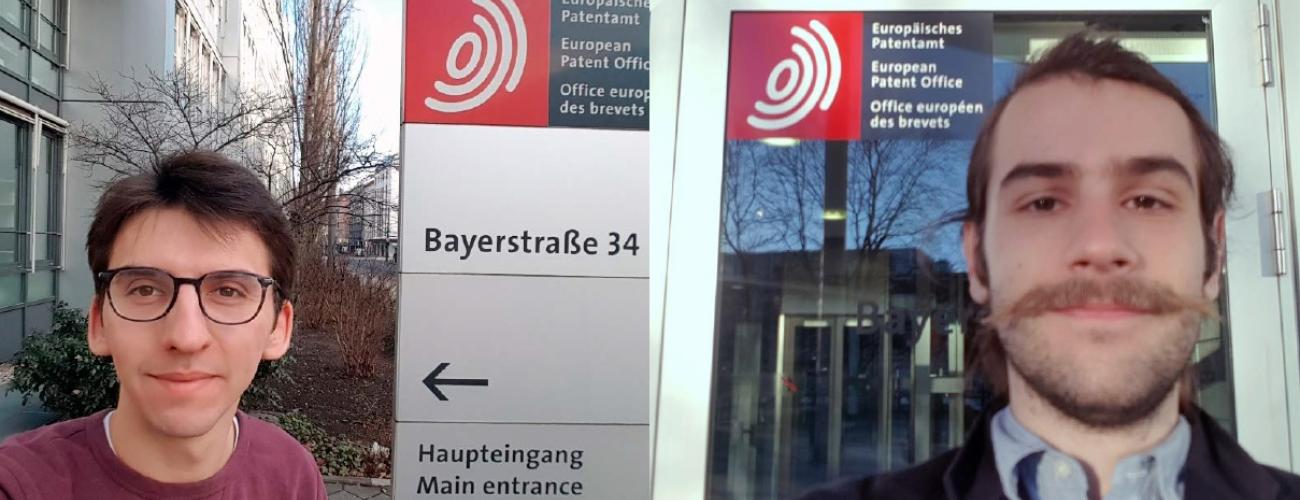
Newsletter 15: The Pan-European Seal programme: the Erasmus of intellectual property
In 2021, ParisTech signed an agreement with the European Patent Office (EPO) and the European Union Intellectual Property Office (EUIPO) to enable students and graduates from the ParisTech schools to do a traineeship under the Pan-European Seal programme. For trainees this represents a unique opportunity to work in an international, intercultural environment and acquire skills and knowledge in the fields of patents and intellectual property. We spoke to Baptiste Borowczak & Léandre Lallemand (Chimie ParisTech – PSL) who are now on the Young Professionals programme at the European Patent Office.
How did you find out about the Pan-European Seal programme at the European Patent Office?
BB : In an email from the Office of International Relations at Chimie ParisTech – PSL. It sounded like an interesting opportunity – a chance to find out more about the world of intellectual property and work in a multicultural environment.
LL : An information email was sent out to students in November, and I started looking into the programme then.
What did the application process involve?
BB : I had to fill in an application form online and write a letter of motivation in English. After that, I was invited to attend an interview with one of the people in charge of the programme. The interview was in English and lasted 30 minutes. The person interviewing me asked what I’d studied, why I was interested in the traineeship
and what I hoped to get out of it, whether I wanted to learn German, what sector I was most interested in,
and whether I thought I’d miss doing lab work. To prepare, I watched videos of previous trainees on the EPO website and got in touch with a Spanish trainee via a former Chimie ParisTech student who was working at EPO. Two weeks after my interview I got the good news. I signed my training contract and sent off the various documents required. You also have to do two MOOCs (24 hours in total) before you start the traineeship.
LL : Before applying I read a lot of reports from previous trainees. I looked at the profiles of trainees on LinkedIn to see what they’d studied and published, and I talked to a patent engineer I knew. I submitted my application online, and got a message saying somebody would contact me. The Human Resources department sends applicants’ CVs to all the
units interested in hosting a trainee, so quite often candidates are invited to an interview with several different units. I had an interview with the Membranes Unit and another with the Cosmetics & Galenic Formulation Unit, and I now work in the Gas Processing & Distillation Unit.
What did you hope to get out of the programme? Was it what you expected?
BB : After my internships, I didn’t particularly want to go into research, but I liked being immersed in science. I’m not keen on lab work, so the field of patents appealed to me, as I thought it would give me chance to be involved in the latest scientific developments without actually doing development work myself.
LL: I did my final-year internship in Brussels in an international space engineering firm and I really enjoyed
the intercultural environment. More than 40 countries have signed the European Patent Convention, so doing a traineeship at EPO is a bit like Erasmus for graduates! Moreover, all companies value experience in patents, so it’s a good thing to have. The programme is very good. The only problem is accommodation. Munich is an
expensive city. The staff at EPO are keen to foster a sense of team spirit among each cohort of Young Professionals. They organise lunches and city tours for example. The initial part of the training lasts one and a half months and is very comprehensive. There’s a lot of support. We have a tutor who supervises us and shares experience. I find it very easy to talk to him and to my other colleagues. Working as a patent examiner is quite a solitary job, but we see all kinds of technologies and innovations. It’s interesting to see so many new inventions.
EPO made some changes in 2022. As well as the original Professional Traineeship Programme, it now runs a Young Professionals Programme. You joined EPO in 2021 on the traineeship programme, and you’re now on the Young Professionals Programme. Can you tell us more about that?
BB : My first year, as a trainee, was mainly about acquiring skills in the field of intellectual property. Now that I’m in my second year I have chance to strengthen and develop those skills. I’m still part of the “Natural Polymers” Unit. The employment conditions on the Young Professionals Programme are better than on the traineeship programme. The administrative aspects are simpler too, especially regarding tax. On this programme, we can spend up to six months working at a national intellectual property organisation, and we can apply for positions at EPO itself – even before finishing our programme.
What career prospects are there?
BB : I’ve been recruited to work as a patent examiner at EPO in Munich for five years, starting in February. This will give me the opportunity to discover new aspects of the field, because as a Young Professional, I’m not authorised to perform certain tasks – highly regulated activities like patent opposition for example.
LL : I’m going to apply to do another two years on the programme. I really like working in such an international environment.
Click here to read an account from Brice Tayama (AgroParisTech), who did a traineeship in 2021-2022.
Applications for the 2023/2024 programme are now open. Students interested in applying should contact the Office of International Relations at their school by 24 February.

